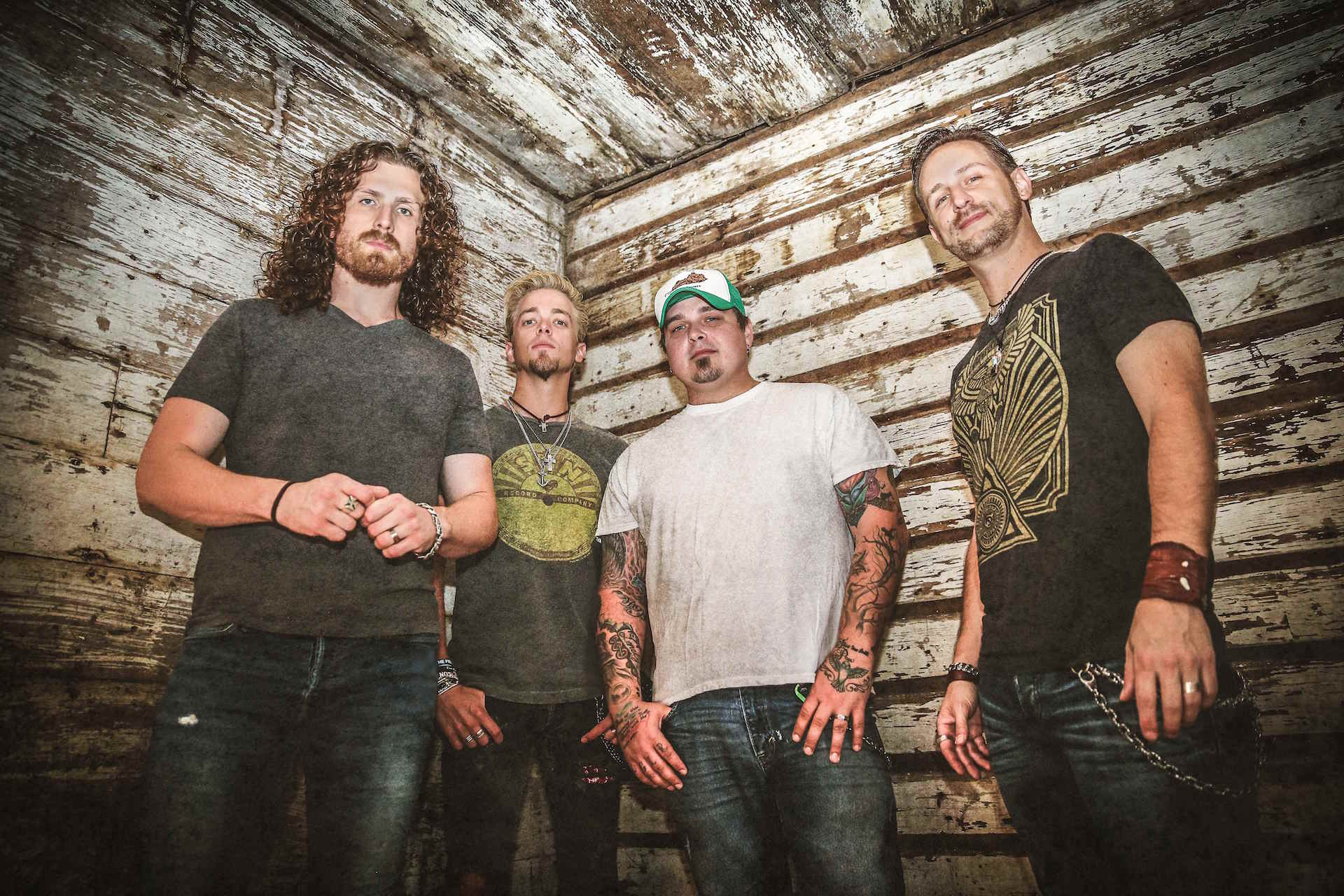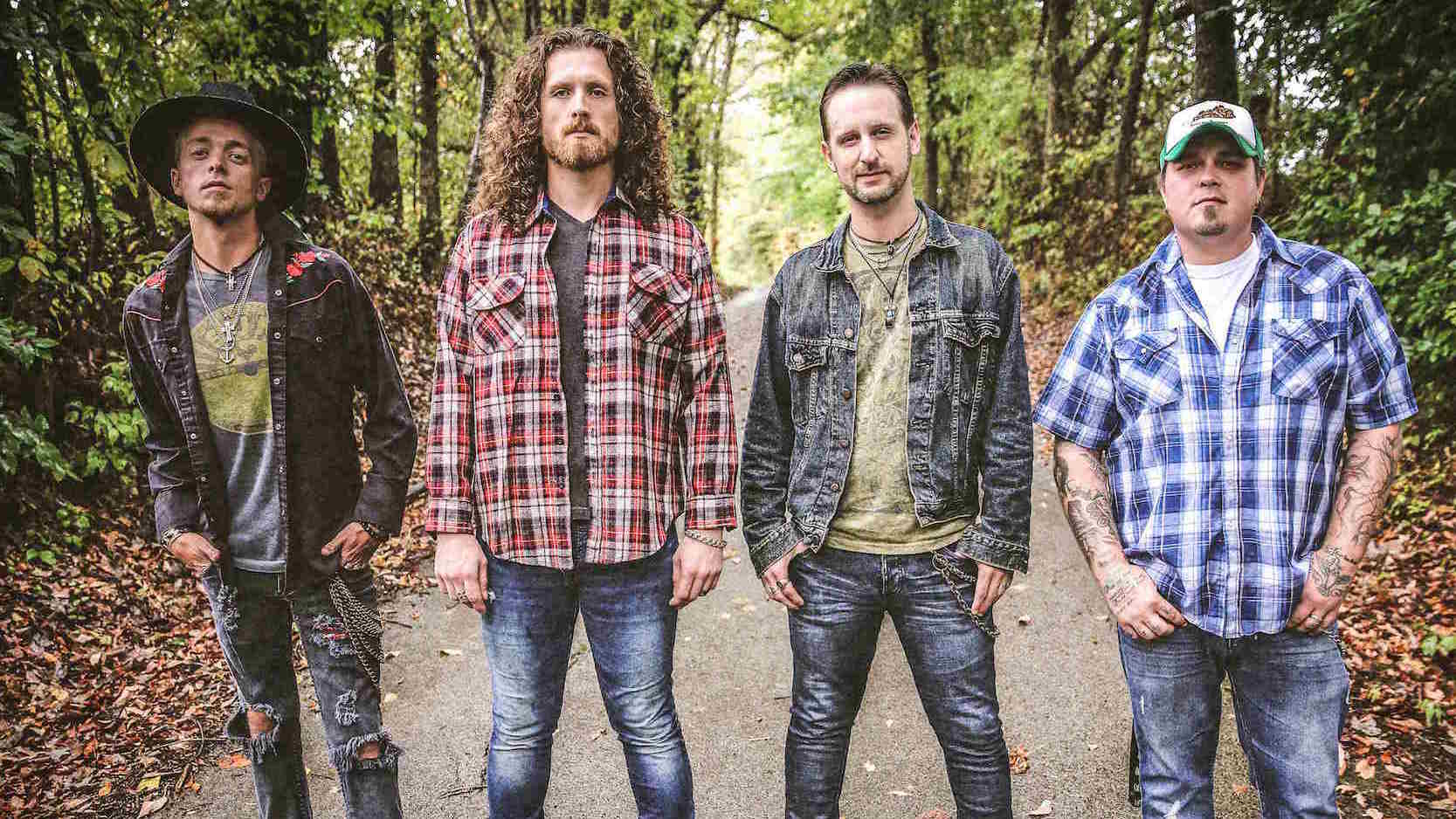During the last 15 years, Black Stone Cherry have gone from playing bars to headlining arenas.
But the last 18 months have been the most eventful for the Kentucky quartet.
Following a tour which included a date at London’s Wembley Arena in late 2014, they returned to the US to discover that they were no longer on Roadrunner, the label that was their home since the release of their 2006 debut album.
Undeterred, the band – Chris Robertson (vocals, guitar), Ben Wells (guitar), Jon Lawhon (bass) and John Fred Young (drums) – returned to the UK the following year and headlined the second stage at Download, for the second time in two years, no less. While they were at Donington, they met with several labels and eventually signed up with Mascot Records – home of Joe Bonamassa and Black Label Society. Now, they’re set to release their fifth studio album.
Kentucky is a return to the band’s grittier roots – but it’s much more than that. So, in the run-up to its release, TeamRock sat down with John Fred to get the lowdown on their new album and consider the idea of Donald Trump becoming one of the most powerful men in the world.
How would you describe the past 12 months?
John Fred: “This past year has been really crazy for us. We came off that arena tour in 2014 and that was epic. We never dreamed of headlining our first arena tour. Then we got home and we started writing for this album Kentucky, but it just so happened that we got released from our record label. But it was the best thing that could’ve happened to us. It was such a great fresh start for the band. We were in the catbird seat, man. We were literally sitting there as a free agent, Jerry Maguire style. It was terrifying to begin with, being out there in the open, but once we started writing songs it was just so liberating to not have anyone saying, ‘Radio in America sounds like this, so you should write like this.’ We’d gotten past that anyway, because we said a long time ago that we’re not an American radio rock band. We’re an American rock band from the South that has worked our asses off and built everything from the ground, and that’s what all of our fans worldwide love about us. We’ve always tried to not conform to a certain sound or style.”
What made you sign with the Mascot Label Group?
“Well, we were at Download and we had four or five different labels come and talk to us. We were flattered to death by that. It was like being the single girl at the party with all these suitors flocking around. But we’ve found a great home with Mascot. We met with the owner Ed [Van Zijl] and it was the most refreshing talk we’ve ever had with a record label boss. We went for dinner with him in Switzerland and as soon as we got there he was like, ‘What guitars do use guys use? Tell me, because I’m a guitar player.’ It’s so rare to find a guy that owns a record label who’s also a musician, as crazy as that sounds, because a lot of those guys are just so removed. So we talked and we said, ‘Dude, we feel comfortable,’ especially with the artists that they have on their label, like Joe Bonamassa and Beth Hart. There are a lot of great acts on Mascot. So we jumped on board.”
You recorded the new album in the same studio where you did the debut album 10 years ago. How was it this time around?
“It was cool, man. It was the first time we’d worked with our buddy David [Barrick, producer] since the first record [Black Stone Cherry] in 2006. The studio [Barrick Recording] is an old music store that he bought after the owner passed away, and it was so weird being back there. It felt like déjà vu because all of the great analogue gear that David records with was still there, and a lot of that sound from our first record came from that.”
You’ve worked with big name producers for the last two albums. How was recording Kentucky in comparison?
“A lot of the time you go into the studio, especially on previous records like when we worked with [Howard] Benson on Between the Devil and the Deep Blue Sea [2011], and it’s like a factory. You go in there and they have all the gear set up, and that’s what you use. They have one drum kit and every guy that’s ever recorded there has used that one kit. We asked the engineer if we could bring in our own gear and he said, ‘You guys can bring in any amp that you want to, it’s just that usually the bands that come in want to use what’s here.’ We didn’t want that. We’re musicians, man. Ben [Wells] and Chris [Robertson] like to create specific sounds with their guitars and amps, and Jon [Lawhon] and myself like to do the same with the bass and drums. It’s an organic process how we record, and that kind of got taken away from us on the last couple of records.”
Did you not enjoy the experience of making the last two albums then?
“I don’t mean to talk negatively about it. The experience that we had as four hillbillies from Kentucky, to all of a sudden be working with one of the biggest producers in the world, we learnt a lot from that formula. It’s all a learning process, man. And any time you’re thrown into cognitive dissonance and you get in a situation where you’re like, ‘Oh my God, I’m in over my head and I’m uncomfortable,’ that only makes you grow, not only as a musician but also as a human. So it was cool, and we took a lot of great things from working with Howard, and also with Joe Barresi [producer] on Magic Mountain [2014]. He’s an epic engineer. He’s done Nine Inch Nails and the Melvins, and all sorts of cool bands. We’ve been fortunate enough to work with a lot great people over years, but on this record we wanted to go home and work with our friends. So we brought in local back-up singers and organ players, and another two guys that played saxophone and trumpet on a song called Soul Machine. It was really different and we had a really good time. It was a lot of fun.”
Since the album is about returning to your roots, was it always going to be called Kentucky?
“The title actually started as a joke. Our buddy Vinnie [Hartong] from our management company [In De Goot] said, ‘Why don’t y’all just call the album Kentucky?’ I have to give Vinnie credit for that one. We were like, ‘Oh my god, that’s it!’ And he was like, ‘Really? I was just kidding, man.’ But we said, ‘No, that’s it dude.’ It embraces everything that we are, where we’re from, and what we want to stand for. You couldn’t find a better fitting title for this record. It was made in Kentucky with all Kentucky musicians, and even though we’re throwing it back to where we used to record, it’s a great fresh start for the band. I think people are going to really dig it.”
Politics seem to be at the forefront of this album, much more so than on your previous records. Is that fair to say?
“Absolutely. I’m 31 years old now and I have a daughter. And I worry about her. She’s the most precious and dear thing in my life. So I worry about how things are going to be in 10 years, when she’s 12. I think once you realise what’s happening around you then you start looking at the bigger picture, and as people we have to sit back and evaluate the positive things that we can do to change the world. In rock ‘n’ roll, or any form of entertainment for that matter, you have a duty to voice your opinion in a positive manner to try and affect positive change.”

Do you feel engaged by any of the candidates running for presidency in 2017?
“I hate to say it, but I can’t trust a lot of those people that are running for president, especially Donald Trump. What the fuck, dude? I don’t consider myself an intelligent person when it comes to politics, but I do know that you can’t have corporations backing people in office because there’s always an underlying motive or agenda. And I don’t watch CNN or Fox because it’s all programmed and bought out media. The way I feel, if America wanted a great person in office then they should put in somebody that’s really going to fight for every class and human equality. I know that things aren’t perfect in the UK, but I was watching a debate in the House of Commons on TV the other day and it’s just so different over here. People stand up and ask the Prime Minister questions, and then he’ll stand up and literally say off the top of his head what he thinks about the idea or the problem, how he thinks the situation can be fixed, and what he and the government is doing about it. People were hollering and everything in there. As an American watching that, it was really eye opening to see how different that process is from ours. In the US it’s all so controlled and regulated, but over here it seemed like an open debate, like they’re actually trying to get to the bottom of things.”
Why did you choose to cover War by Edwin Starr?
“We were actually looking for a cover song to do for the special edition of Kentucky and that song just fit, in terms of the sound and the sentiment. I mean, until everybody comes together and stands up for peace and we stop spending money on war, how are things ever going to change? It came out really good, too. I noticed halfway through recording the track that everybody was looking at each other as if to say, ‘Dude, this song has to go on the album.’ So I think we picked a really good song to cover, and old Edwin would be proud.”
You can hear Motown, funk and soul influences throughout the record. Did you make a conscious effort to broaden your sound with this album?
“This band has always been really harnessed on previous records. Our old label wanted us to sound a certain way for American radio, and we had to fight them the whole time to not sound like Nickelback. And we love Nickelback. We love those guys. But that’s not what we are. A lot of our influence is the blues, R&B and funk, but we could never explore in the past. When we told Mascot that we wanted to do all that stuff they were so cool about it. Ed said, ‘Man, that’s what we want you guys to do. You guys should broaden your platform.’ That was the most refreshing thing in the world. And I don’t mean to sound cocky about it, but it’s about goddamn time because we’ve paid our dues. So on Soul Machine, for instance, we got some great girls from our hometown to sing backing vocals. They’ve been singing in church their whole life and they came in and just killed it. But recording with them was such a surreal experience, because we’ve always been so constrained in the past.”
What do you think has been the cause of those constraints?
“I think that a lot of the time you get producers that have been contracted by labels to make a certain record because that’s what’s hot at that point in time. But the problem with making stuff that’s similar to what’s around at the time is by the time your record comes out that’s in the past. You have to make something that’s genuine and new. That’s what doing this record on our own afforded us, and we got to make the record that we wanted to make. There’s no auto-tune or anything like that. It is what it is. There’s places where Chris bends notes, and sometimes they’re sharp and sometimes they’re flat. The guitars aren’t in perfect tuning either, and there’s drum fills that probably aren’t the best things around. But you can’t make an overly produced record and then go out and play those songs live without using tracks. So many bands do that. But this band will never run tracks. We never have and we never will. Even with the girls on Soul Machine we were like, ‘God, how are we gonna do this live,’ and at some point in time we’re going to have to bring people out to sing those parts. We’re old school like that.”
The album also sees you wear your metal influences on your sleeve, especially on Darkest Secret. Would you say that’s the heaviest song you’ve ever written?
“We actually had this song for Magic Mountain, but it was between this song and Never Surrender as to which song made the album, and in the end we went with Never Surrender. It’s an evil song, right? I’m glad we kept it back for this album. And it’s exactly what the lyrics are; it’s about an underlying secret that you don’t ever know about a person. I remember recording the song, and the feeling I got from it reminded me so much of the first Sabbath record. I can’t wait to play this song live. We’ve done Sabbath-esque moments in songs before, but this whole track just goes down the rabbit hole. This one and Hangman are our odes to Sabbath. We’re huge Sabbath fans, man. And going back to that political thing, it’s a weird and dark time in the world right now. I don’t know if our songs are going to change anything, but I know at the same time that a song like Peace Is Free [taken from Black Stone Cherry’s 2008 album Folklore and Superstition] has been very important for a lot of people. It’s a song about hope, and a song about peace. It’s amazing to see a song that you write change peoples’ outlooks and directions, and we always try to keep that in mind, which is why we always try to write positive songs.”
There are lots of classic Black Stone Cherry moments on the album too, particularly on songs like Cheaper To Drink Alone.
“Absolutely. I kind of compare that song to White Trash (Millionaire) or (Blame It On The) Boom Boom. We actually wrote it to pitch to Jason Aldean [an American country singer], but we decided it was so badass that we had to keep it. I think it’s definitely going to become one of our party anthems. And you’ve gotta have those moments dude, otherwise it wouldn’t be Black Stone Cherry.”
You’ve got the ‘lighter in the air’ moment with Long Ride as well.
“Yeah, that song’s in the vein of In My Blood, isn’t it? Chris started coming up with that one on the tour bus one day. I think we were in Germany somewhere last year. I immediately pictured it in my mind at the big festivals and arenas. It came out really cool, man. We’re all really proud of that song. It’s really near and dear to Chris, too. His grandpa passed away last year, and this is a really special song to him.”
The best thing about Kentucky is that you’ve managed to explore all these different styles while still sounding like Black Stone Cherry.
“Thank you sir, I really appreciate that. We’re proud of this album. Artistically speaking, in the past we’ve been contained. I’m not going to sit here and not say that. We were always trying to make the most authentic rock ‘n’ roll that we could, whilst at the same time trying to please label people. So this is just the beginning, man. Kentucky is just the beginning of where we will go. You look at Led Zeppelin, and they changed with every single record, but they always stayed Led Zeppelin. And we’ll always be Black Stone Cherry. But now it’s time for us to grow. We’re so excited right now. Life could not be better, man!”
Kentucky will be released on April 1 through Mascot Records. You can pre-order it here.

